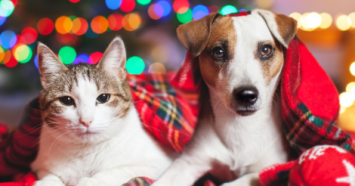
Before you get too distracted by winter holiday hubbub, take a little time to put some pet safeguards in place – whether you’re staying home or hitting the road with your pets.
Keeping Your Pet Identifiable
You should always keep your pet up to date with their tags and other identifying features. However, the holidays can mean more chaos and door-dashing opportunities. In the scenario that your pet would escape, having a way to track them down is vital. Follow these tips to ensure your fur-baby doesn’t go missing:
Make sure your pet’s ID tags are accurate.
Inspect your pet’s collar for wear or broken clasps, and replace if necessary.
Have your veterinarian scan your pet’s microchip to make sure it’s working.
Double-check the online microchip database to ensure your contact information is up to date.
Note: if you are traveling with your pet around the holidays, have a traveling ID tag made that lists your pet’s name, the fact that she is currently traveling, and your mobile number.
Holiday Pet Safety at Home
Pets are more likely to escape when you have more people coming and going from your home. Doors left open. Gates not properly latched. Simply put, your guests don’t know your pet’s routines or whatever behavior management techniques you use without even thinking about it.
How to Prevent Your Pet From Escaping
Walk your fence line looking for gaps, holes, and other containment issues.Inspect and repair all door and gate latches that lead to unfenced areas. Use padlocks on fence gates, if necessary. You can also use carabiner clips, like those used in rock climbing, to keep gate latches more secure.
Borrow or buy baby gates to provide barriers well before often-used doors. (I’ve purchased most of mine at thrift stores.)
Set up and acclimate your pets to a safe zone in the house, if it’s better for them to be kept away from holiday hoopla.
Remember to Safeguard Kitchen Food Hazards
Keep holiday foods that can be toxic to pets well secured in your pantry when not in use. Raisins, baker’s chocolate, certain nuts, and other foods you might not have in the house the rest of the year can all be dangerous for pets.
Keep pets out of the kitchen when those foods are actively being used. You’d be amazed how many raisins a motivated pet can snarf down when your back is turned.
Protect Both Pets and Visitors
Have your veterinarian check your pets, especially elderly ones, for any hidden illnesses before the holidays. Pets who don’t feel well are much more likely to act out toward people they don’t know.
Never leave pets and guests alone together unsupervised – especially children.
If pets seem stressed by holiday celebrations, let them hang out in a quiet, safe place away from guests.
Holiday Pet Safety on the Road
If you’re traveling this holiday season, make sure to follow the identification steps stated at the beginning of this article. It is always better to be safe and take a few extra precautions when traveling with pets as well:
Be Safe in the Car
Make sure you use some form of pet restraint in the car – crates, pet seatbelts, etc.
Put copies of your pet’s vaccination records in the glove box of your car, just in case anyone asks to see them while you’re traveling (especially across state lines).
Map out your rest stops along the drive.
Plan for Pet Emergencies
Look up the closest veterinary emergency hospitals along your route and especially near your destination, in case your pet falls ill or gets injured during your trip. Also consider pet insurance for emergencies so you know you and your pet are covered for the worst.
Ask Your Host for Help
Make sure to use the at-home checklist above. If you know your host well enough, ask that they help secure their home for your pets. Remember to always carefully supervise your pet with any of your host’s pets or other guests. And have a happy holiday!